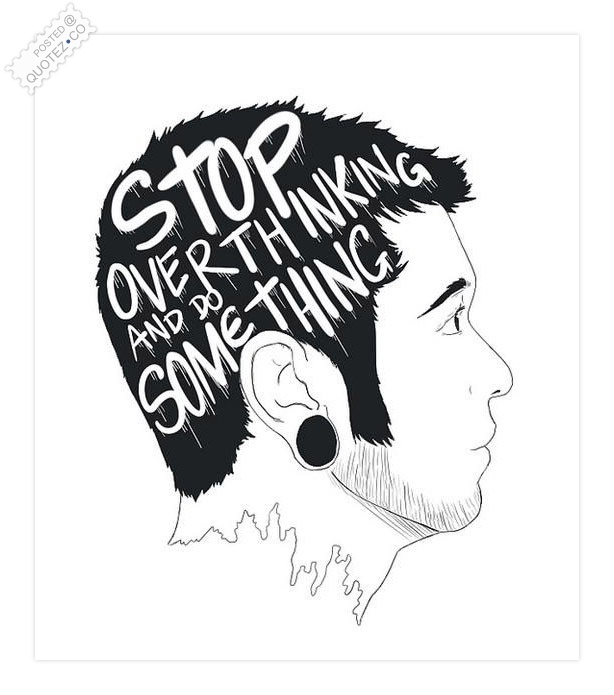It’s when you do a whole lot of thinking … but you never take action.
Let’s look at New Year’s Eve resolutions as an example. Every year, millions of people say they’re going to make big changes in their lives. And yet only 12 percent of folks stick to their resolution.
Why?
It’s not that they don’t want to change. But when you don’t set a plan in place for getting off your butt and taking the steps necessary to making your goal happen, then failure is often the result.
Here are 10 easy ways to stop overthinking and start doing.
 Set short time limits for decisions.
Set short time limits for decisions.
One of the easiest ways to stop overthinking is to give yourself “decision making deadlines.” It’s okay to take some time to think through tough decisions. But most decisions shouldn’t require a lot of your time. Here’s what I do: set a reminder on my phone when I need to make a decision quickly and am spending too much time thinking about it.
Become a person of action.
The first step is often the hardest. But it’s the most important. If you want to change something in your life, you need to take action now. It sounds simple but most of us just don’t do it. Want to lose weight? What have you done today to make that happen? Want to quit your job and work for yourself? What action have you taken today to achieve that goal? Take baby steps … starting this moment.
Let go.
One of the most important lessons to help you stop overthinking is this: you can’t control everything. There will always be circumstances beyond your control. So embrace your fears, and face them head-on. Don’t be afraid to stumble. Because you’ll learn valuable life lessons with each failure that will only serve to help you grow.
Write down your action plan and track your progress every day.
This is by far the most effective strategy I’ve used to stop overthinking and become a man of action. It’s very simple too. Pick up a cheap daily planner (or find one online). At the beginning of each week, write down the things you want to accomplish that week. Then, every day record what actions you’re taking to get there. Every day one of the first things I do is list out the things I’m going to do to achieve my goals. And when I check those things off my list, I know I’m closer than I was the day before.
Burn some calories.
Exercise is an amazingly therapeutic way to free your mind of negative thoughts and help you keep a healthier body and a healthier mind. Exercise doesn’t have to be a chore either. Find an activity you love to do, then start doing it every day … even if it’s for five minutes. Once exercise becomes a habit that’s part of your every day life, you’ll notice that you start to become a better decision maker (and you’ll look and feel better too).
Meditate.
Meditation is a scientifically backed method to help you relax and free your mind. Even taking a few minutes every day and focusing on just breathing slowly and deeply can have a profound impact on your life. It’s one of the best ways to help you put things into perspective and stop overthinking.
Read something inspiring.
Sometimes too much reading can be counter-intuitive. But reading inspiring words can help you develop a more positive, motivated mindset. Don’t just read and do nothing though. The key is to take that positive energy and turn it into some type of action that gets you closer to where you want to be.
Do something spontaneous.
Spontaneity is a fantastic way to break you out of a funk and help clear your head. Many of us don’t think we have a lot of opportunities to be spontaneous because of work and family constraints. However, being spontaneous can be something as simple as trying a new food; going to a new class at the gym; or watching a new TV show. The point is, you want to place yourself out of your comfort zone so you can experience different ways of thinking … which can in turn prevent overthinking.
Talk to a mentor.
A lot of times when you’re stuck, an outsider’s opinion can help you overcome your tendency to overthink and overanalyze. So don’t be afraid to ask for help. Talk to someone you respect and tell them about your challenges. You’ll find that most people are happy to help, and appreciate the fact that you respect them enough to ask them for help.
Make a commitment.
Dr. Robert Cialdini says in his book, Influence: The Psychology of Persuasion, “Once a stand is taken, there’s a natural tendency to behave in ways that are stubbornly consistent with the stand.” Commitment is a psychological principle that is one of the best ways to help you stop overthinking. It’s this simple: state out loud what you commit to doing, and frame it as something specific you will do. For example, “I commit to losing 10 pounds and getting in the best shape of my life.” Then go and tell everyone you know, which will keep you more motivated and accountable to taking action.



